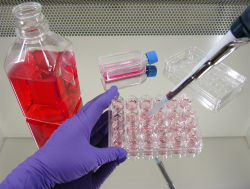Transglutaminase enzyme - role in disease
Deregulation of enzyme activity disrupts cellular homeostasis and often leads to diseases such as Alzheimer's, Huntington's and CD. TGs are a group of enzymes that catalyse the post-translational modification of proteins, especially the formation of isopeptide bonds that make proteins more resistant to hydrolysis. The TRANSCOM (The commercialisation of transglutaminase) project investigated the involvement of TGs in the pathogenesis of CD, neurodegenerative disorders and catheter-associated infections such as methicillin-resistant Staphylococcus aureus (MRSA). A significant achievement, researchers developed a novel lateral flow test that can detect IgA and IgG deamidated gliadin peptide antibodies for diagnosing CD. Benchmarking revealed that unlike other point of care tests, this test detects all CD cases. The incorporation of such CD biomarkers in new point of care tests could obviate the need for invasive diagnostic procedures. Scientists also identified a major CD autoantibody-binding epitope in TG2 as well as monoclonal mouse anti-TG2 antibodies that could be used to treat CD. The TG2 inhibitors in particular have shown great promise in prohibiting the pathological effects of CD antibodies. TRANSCOM generated TG mutants as well as TG inhibitors and developed cell culture models to test their neuroprotective effects in neurodegenerative disorders. They demonstrated the feasibility of small compound inhibitors blocking Factor XIIIa activity in preventing catheter fouling and associated MRSA infections. Other interesting discoveries include the potential utility of TG2-inhibitors in blocking vascular endothelial growth factor -induced angiogenesis and TG2 with certain amino acid mutations in treating TG2 related diseases such as liver fibrosis. TRANSCOM's impressive accomplishments resulted in the publication of 21 research papers in peer reviewed journals, media press releases and the filing of a patent on TG2 inhibitors. TRANSCOM provided insight into the biological relevance of TG activity. Given the lack of effective therapies against CD and neurodegenerative disorders, project findings show considerable promise for the development of alternative treatment approaches. The market for these diseases is worth billions of dollars and successful commercialisation should enhance the competitiveness of participating businesses.
Keywords
Transglutaminase enzyme, coeliac disease, drug-resistant infections, neurodegenerative disorders, biomarker, catheter fouling



